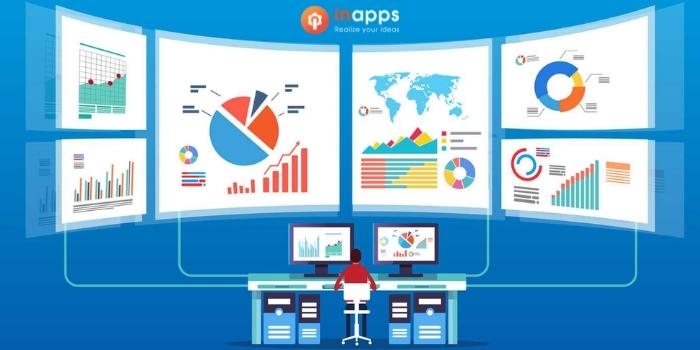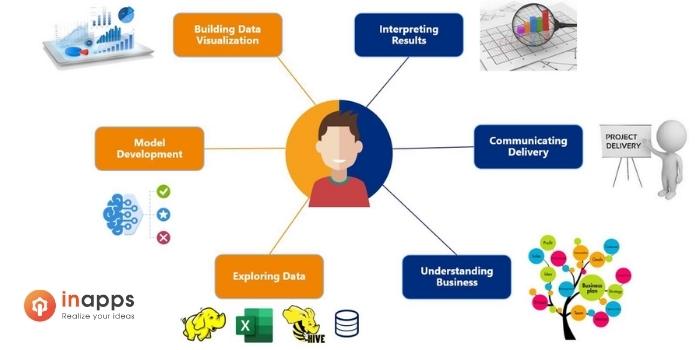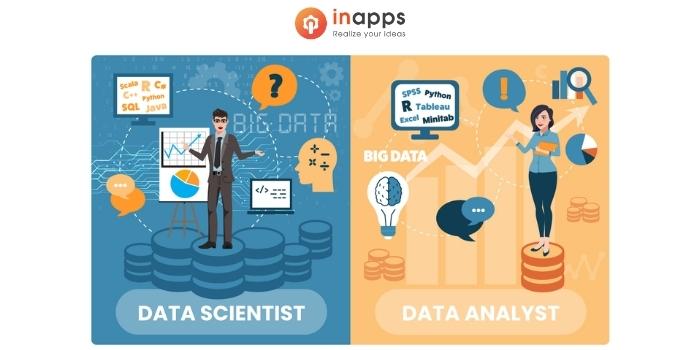With Data Science emerging so rapidly, there seems to be a question that very frequently dwells in the brains of applicants. Data Scientist vs Data Analyst – what is the difference?
Is it the same and people have been using it interchangeably? Or are they actually two different terms and profiles?
These problems have been a source of great uncertainty among young folks who want to pursue a promising career in data science or vice versa. Today, we are here to address these questions and put them to rest once and for all.
Let us first start with understanding the basic difference between the profiles before heading straight into an in-depth analysis.
Key Summary
- Overview: The article compares the roles of Data Analyst and Data Scientist, detailing their responsibilities, skills, tools, and career paths, as presented by InApps Technology in 2022.
- Data Analyst:
- Role: Focuses on interpreting data to provide actionable business insights, often working with structured data to answer specific questions.
- Key Responsibilities:
- Collect, clean, and organize data from databases or spreadsheets.
- Create reports, dashboards, and visualizations to communicate findings.
- Analyze trends to support business decisions (e.g., sales performance, customer behavior).
- Collaborate with stakeholders to define KPIs and metrics.
- Skills:
- Proficiency in SQL for querying databases.
- Data visualization tools (e.g., Tableau, Power BI, Looker).
- Statistical analysis and basic modeling.
- Strong business acumen and communication skills.
- Tools:
- Excel, SQL, Tableau, Power BI, Google Analytics.
- Basic Python or R for data manipulation.
- Typical Background: Business, statistics, or economics; often requires a bachelor’s degree.
- Use Cases:
- Building sales dashboards for retail companies.
- Analyzing marketing campaign performance.
- Tracking operational metrics for process optimization.
- Data Scientist:
- Role: Builds advanced models and algorithms to predict outcomes or uncover complex patterns, often working with unstructured or big data.
- Key Responsibilities:
- Develop machine learning models for prediction or classification (e.g., churn prediction, recommendation systems).
- Process and analyze large datasets using advanced statistical methods.
- Design experiments to test hypotheses or optimize systems.
- Deploy models into production and monitor performance.
- Skills:
- Advanced programming (Python, R, Scala).
- Machine learning frameworks (TensorFlow, Scikit-learn, PyTorch).
- Big data tools (Hadoop, Spark, Kafka).
- Deep statistical and mathematical knowledge.
- Tools:
- Python, R, Jupyter Notebooks, AWS, Azure ML, Databricks.
- SQL for data extraction; cloud platforms for scalability.
- Typical Background: Computer science, mathematics, or engineering; often requires a master’s or PhD.
- Use Cases:
- Developing AI models for personalized e-commerce recommendations.
- Predicting equipment failures in manufacturing.
- Optimizing pricing strategies with predictive analytics.
- Key Differences:
- Scope: Data Analysts focus on descriptive and diagnostic analytics (what happened, why); Data Scientists emphasize predictive and prescriptive analytics (what will happen, what to do).
- Complexity: Analysts handle structured data and simpler tools; Scientists tackle complex, unstructured data with advanced algorithms.
- Technical Depth: Analysts need basic coding and stats; Scientists require deep programming and ML expertise.
- Output: Analysts produce reports and dashboards; Scientists deliver deployable models and systems.
- Business Impact: Analysts support tactical decisions; Scientists drive strategic innovation.
- Overlap:
- Both roles involve data cleaning, statistical analysis, and collaboration with business teams.
- Analysts may transition to Scientist roles with additional training in ML and programming.
- Salary Trends (2022):
- Data Analyst: $50,000-$90,000/year (US, entry to mid-level); $20,000-$50,000 (offshore, e.g., Vietnam).
- Data Scientist: $80,000-$150,000/year (US, entry to mid-level); $30,000-$80,000 (offshore).
- Rates vary by region, experience, and industry (tech, finance pay higher).
- Challenges:
- Data Analyst: Translating technical findings into business-friendly insights; limited scope for innovation.
- Data Scientist: Managing model deployment and production issues; high expectations for impactful predictions.
- Conclusion: In 2022, Data Analysts excel in delivering business insights through data visualization and reporting, while Data Scientists drive innovation with predictive models and advanced analytics, as highlighted by InApps Technology. The choice between roles depends on technical aspirations, business needs, and desired career trajectory.
An Introduction
A Data Scientist is somebody who, based on historical trends, can foresee what will happen in the future, while a Data Analyst is somebody who simply analyses significant data insights.
The duties of a Data Scientist include estimating the uncertain, while the tasks of a Data Analyst include aiming at the known from fresh perspectives.
It is presumed that a Data Scientist will produce their own concerns while a Data Analyst will seek solutions to a given collection of data questions.
A Data Analyst tackles business challenges, whereas a Data Scientist not only tackles business challenges but also catches up with those issues which once addressed would have the most value creation.
But this isn’t it. This was a basic description of what each of the job profiles entails. However, there is more to it and we would like you to have access to the in-depth information about it while we carry the Data Analyst VS Data Scientist comparison forward.
A Day in the Life of a Data Analyst

A lot of organizations can gain an advantage from getting a Data Analyst on board, it is beneficial in a lot of sectors—from healthcare industries to the IT sector to fast food places. For companies who would like to learn more about the requirements of customers or end-users, the information that data analysts bring to an organization can prove to be important.
Irrespective of the sector wherein they operate, Data Analysts may expect to spend their time building data collection systems and assembling their results into reports that can enable their businesses to grow.
Data Analysts rummage through data to produce reports and visualizations to discover what insights that exist somewhere in the data. Following are some of the major roles and responsibilities that are expected out of a Data Analyst:
- Data gathering
- Cleaning data
- Processing data
- Producing reports
- Locating trends & patterns
- Collaborating with stakeholders
- Setting up infrastructure
A Day in the Life of a Data Scientist

For any company that can take advantage of the abundance of data, the major development is a big deal. A data scientist is someone who has knowledge of analytics, data science, Big Data, R, and Python.
Data scientists are known to have amazing problem-solving capabilities. They try to recognize the problems that require solutions and keep coming up with various methods to bring a solution to the table.
The everyday activities of a data scientist mostly revolve around data, just like its name suggests. Data scientists invest a great deal of their time collecting information, analyzing data, defining data, all for several different purposes and in many varied contexts. Data-related activities that could be handled by a data scientist include:
- Collecting and merging data
- Analyzing data
- Identifying patterns or trends
- Make use of several tools, including R, Tableau, Python, Matlab, Hive, etc.
- Building and testing new algorithms
- Coming up with data solutions
- Creating predictive models
- Developing data visualizations
- Writing up results
- Getting together proofs of concepts
The skillset of Data Analysts and Data Scientists kind of overlap with each other, but there is a substantial distinction between the two too. Both the job profiles want you to be good at mathematics, have extensive knowledge of algorithms, great communication skills, and an understanding of software development.
The Advent of Data Analysis & Data Science
The existence of such vast quantities of data has been seen by companies as a source of competitive advantage. It is apparent that businesses who could easily use this data can make stronger business conclusions and respond responsibly, directly placing them ahead of competitors who did not have these insights.
With the huge amount of data, the need for professionals with a new skill set arose. A job role that included business experience, customer/user insights, analytical skills, mathematical skills, coding knowledge, machine learning skills, data visualization, and more. This contributed to the rise of jobs for data scientists- people who combine sound business experience, data handling, programming, and visualization skills to produce better business outcomes.
Data is everywhere and thus the world needed someone who can draw essential conclusions from this data. This is when data analysis and data science became essential aspects. Both fields have become one of the world’s most respected and successful occupations in just a few years after their inception.
What is the difference between data scientist and data analyst?

So how does the job of a data analyst is different from that of a data scientist?
Some of the tasks that are dealt with by a data analyst are much of the same, but the leadership aspect is a little distinct. To give it more meaning, let us look at a few examples:
Typically, it is assumed that a data scientist will identify the problems that will benefit an organization and then continue to address them, while the company representative will provide a data analyst with problems to find a solution with that guidance.
It is presumed that both profiles will compose queries, coordinate with technical staff to obtain the correct information, perform data munging (getting data into the correct format, simple to analyze/interpret), and extract relevant data. In certain instances, it is not anticipated that a data analyst can create statistical models or be experienced in ML and advanced programming. Instead, a data analyst usually works with other BI tools/packages or on simplified structured SQL or similar databases.
Requirements For A Data Analyst
An ideal Data Analyst candidate is expected to have an undergraduate STEM (science, technology, engineering, or math) degree. It is considered to be necessary but is not required these days. However, the candidate is required to have extensive knowledge of mathematics, science, programming, databases, and predictive modeling.
Skills of a Data Analyst:
- Degree in math, analytics, science, or statistics.
- Hands-on experience with languages such as R, Python, Java, SQL.
- An effective blend of analytical abilities, cognitive enthusiasm, and expertise in reporting.
- A decent knowledge of data mining methods and innovative technologies including MapReduce, Spark, ML, Deep Learning, artificial neural networks, etc.
- Good understanding of agile development methodology.
- Exceptional written and verbal communication skills.
- Experience in working with Microsoft Excel and Office.
Requirements For A Data Scientist
Data scientists differ from data analysts in many ways such that they are required to have more technical and mathematical knowledge. With data analysts, it becomes quite mandatory to hold a degree in Computer science. A data scientist must also be comfortable communicating their results to the organization’s stakeholders in addition to having a good understanding of data. It is not a simple job to identify someone qualified in mathematics and coding who is also skilled in communicating.
Skills of a Data Scientist:
- Master’s degree or Ph.D. in statistics, maths, or computer science.
- Knowledge of languages like R, Python, SQL, etc.
- Knowledge of statistical and data mining methods, which include linear model/regression, random forest, boosting, trees, text mining, and more.
- Knowledge of methods such as clustering, decision tree learning, and artificial neural networks in ML.
- Knowledge of advanced statistical methods and principles, including regression, distribution properties, and statistical tests.
- 4-5 years of experience in data set manipulation and statistical model development.
- Web-service experience: Redshift, S3, Spark, DigitalOcean, etc.
- Knowledge of distributed data/computing tools: Map/Reduce, Hadoop, Hive, Spark, Gurobi, MySQL, etc.
Salary of Data Analyst Vs Data Scientist
Data Analyst
How much do data analysts make?
According to Glassdoor, the average salary of a Data Analyst in the US is around $62k that can go as high as $95k. With increased knowledge and experience, there is always an opportunity to grow even further. Data Analyst lesser skills and efforts than Data Scientist which means their sa

Data Scientist
Glassdoor maintains that the average annual salary of Data Scientists is $113k/yr that can go as high as $154k. The job of a Data Scientist is much more demanding than that of a Data Analyst and thus has always deserved a higher pay.

Data Scientist Vs Data Analyst: A Final Comparison
Now that we have covered the major differences between a Data Scientist & Data Analyst, let us sum up both the profiles and have a look at some of the key takeaways.
| Data Scientist | Data Analyst |
| They should have knowledge of database systems like MySQL, Hive, etc. | They should have knowledge of data warehousing, business intelligence. |
| It is required for them to have a basic understanding of Python, Java, SQL, etc. | It is required for them to have a strong understanding of Hive, HBase, MapReduce, etc. |
| Should have a clear understanding of various analytical functions- median, rank, etc and how to use them on data sets. | Should have an in-depth exposure to SQL. |
| Perfection in mathematics, statistics, correlation, data mining, and predictive analysis. | Perfect with the tools & components of data architecture. |
| Deep statistical insights and knowledge of machine learning- Mahout, Bayesian, Clustering etc. | Knowledge of various ETL tools for transforming different sources of data into analytics data stores. |
Wrapping Up
Of course, if you think about it then one might need to invest more efforts into being a data scientist than what being a data analyst requires. If you have a professional qualification in one of those disciplines and you thrive in math, statistics, and programming, then you would most definitely be a prime fit for a data science profession.
However, if you are just getting started and are fantastic with maths and numbers mostly, but still need to develop your expertise in data modeling and programming, then you would be a perfect fit for being a data analyst instead. And if you are already aiming to become a data scientist, then you can always join that path even if you are already a data analyst.
To sum it up, both Data Analytics and Data Science are successful and interesting fields, and you can choose either of the profiles and it will still be a great decision.

FAQs
What is the objective of data analytics?
The objective of data analytics is more on the contextual viewing of historical information, whereas data science relies more on machine learning and predictive modelling. Data science is a multidisciplinary blend of algorithm development, data inference, and predictive modeling to solve business problems that are analytically complex.
Does Data Analytics a good career?
Data analysts are some of the most sought-after minds in the world. Since the demand is so high, and the availability of people who can really do this job well is so small, even at the entry level, data analysts enjoy enormous salaries and excellent benefits.
Is Coding a Necessary skill for a Data scientist job?
Data analysts are some of the most sought-after minds in the world. Since the demand is so high, and the availability of people who can really do this job well is so small, even at the entry level, data analysts enjoy enormous salaries and excellent benefits.
What is the role of a data analyst?
Data analysts are some of the most sought-after minds in the world. Since the demand is so high, and the availability of people who can really do this job well is so small, even at the entry level, data analysts enjoy enormous salaries and excellent benefits.
Thank you for reading to the end of this blog. We hope you find it helpful. In case of any queries, you can contact InApps. We would love to help you.
Let’s create the next big thing together!
Coming together is a beginning. Keeping together is progress. Working together is success.
















